- 1 Adding a New POP Account
- 1.1 Start the Account Wizard
- 1.2 Step One: Mail Account
- 1.3 Step Two: Identity
- 1.4 Step Three: Server Information
- 1.5 Step Four: User Names
- 1.6 Step Five: Account Name
- 1.7 Step Six: Finish
- 2 Configuring Your Account
Adding a New POP Account¶
Start the Account Wizard¶
The first time you run Thunderbird, the account wizard will walk you through setting up an account. If the wizard does not open, you can do this:
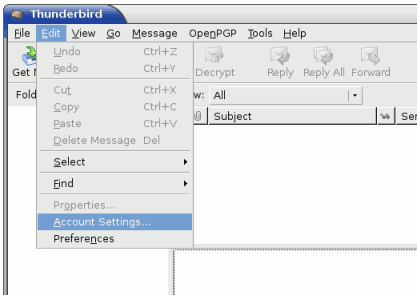
- Choose the menu time Tools > Account Settings…
- Click the Add Account… button.
Step One: Mail Account¶
Once the new account wizard is open, you will see this:
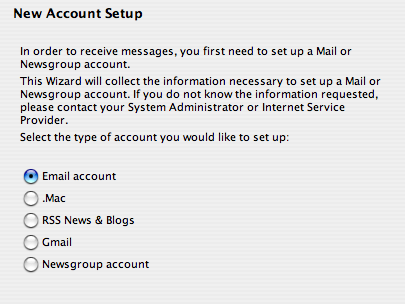
- Select Email account
- Click the Next button.
Step Two: Identity¶
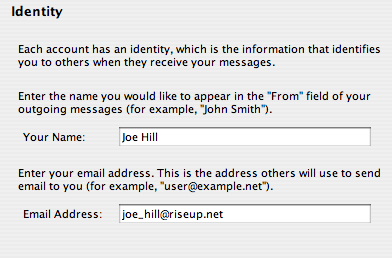
- For Your Name, put whatever you want.
- For Email Address, put your full email address, e.g. ‘mylogin@riseup.net’.
- Click the Next button.
Step Three: Server Information¶
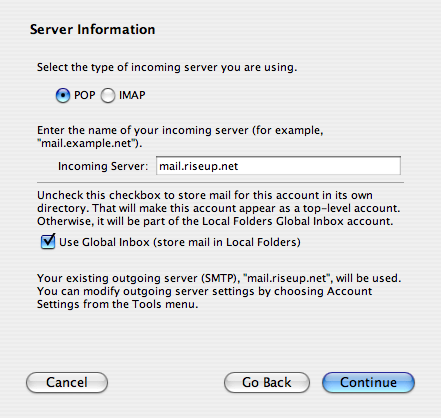
- Select ‘POP’ for type of incoming server.
- For incoming server, put ‘mail.riseup.net’.
- For outgoing server, things get a little complicated. If there is already an outgoing server configured, then the settings for this account will use that configuration. If you haven’t yet configured an outgoing server, enter ‘mail.riseup.net’ for now. It will not work, but will get us to the next question. For configuring the outgoing server, see below.
- Click the Next button.
Step Four: User Names¶
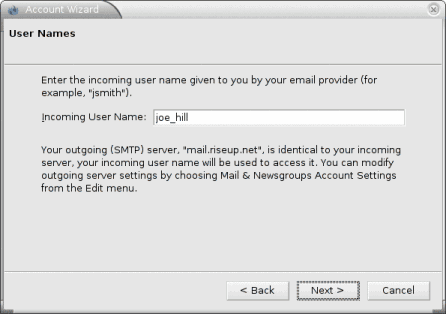
- For User Name, put your riseup.net mail login. For example, if you email address was mylogin@riseup.net, your user name would be ‘mylogin’.
- Click the Next button.
Step Five: Account Name¶
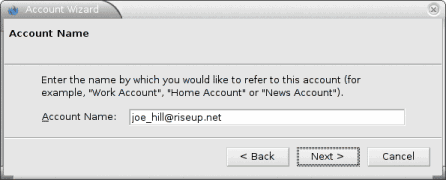
- For Account Name, put whatever you want. This will be the label attached to this account in the list of accounts which appears on the left side of the Thunderbird window.
- Click the Next button.
Step Six: Finish¶
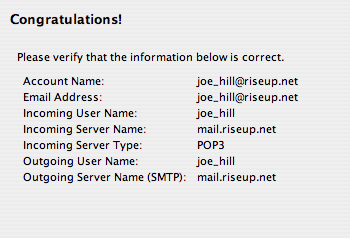
- Hit Finish. This new account will not be fully functional until you make some additional configurations. See the next step, below.
Configuring Your Account¶
Open Account Settings¶

- If the window Account Settings is not open, choose the menu item Tools > Account Settings…
Setting Up Incoming Mail¶
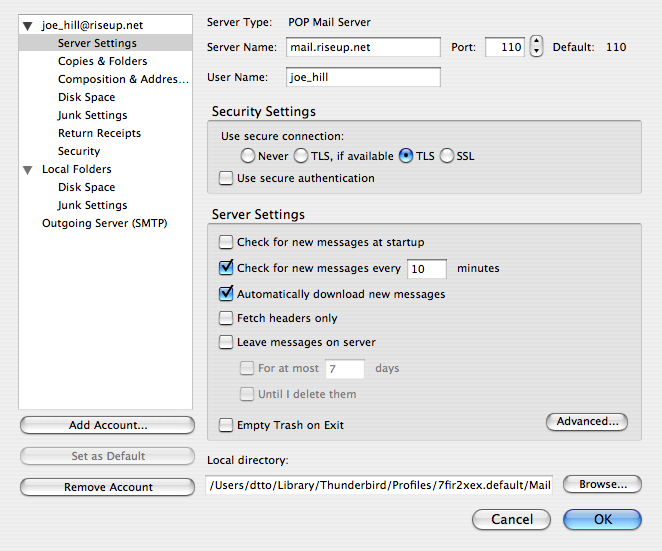
- Click Server Settings for the account you are configuring. If you do not see Server Settings, click the little plus sign next to the account label to expand the settings.
- Check Use secure connection (TLS) and use Port 110. Riseup only supports encrypted connections, without this set you will not be able to check your email! NOTE: Do not get a false sense of security because of this! Using secure connections over TLS is no substitute for encrypting the mail with OpenPGP! (If you have trouble, try checking “SSL” and use port 995.)
- Make sure that Use secure authentication is not checked. Your account won’t work with this option (and it doesn’t provide any additional security if you enabled secure connections).
- Please do not check messages more frequently than once every ten minutes. Every time you check your email, its a drain on our resources, if you do, you might get a friendly letter from us asking you ease up.
- If you want to be able to read the contents of your Inbox from Thunderbird and from the web mail interface, you can check Leave messages on server and then Until I delete or move them from Inbox. For example, this might be useful if you use Thunderbird at home and then use web mail while traveling.
Remember: if you choose to leave messages on the server, they will count toward your limited storage quota. If you download and remove every message from the server, then you don’t have to worry about quota, but you will only be able to access those downloaded messages from Thunderbird.
Outgoing Server (SMTP)¶
At the bottom of the list of accounts, you will see a section to add and configure SMTP servers.- Server Name: mail.riseup.net
- Port: 587
- Check the box that says “Use name and password”
- User Name: joe_hill (don’t put @riseup.net here)
- Newer versions of Thunderbird (version 3.0 and up) will have “Use secure authentication” here, do not check this box
- Older Thunderbird will have here “Use secure connection”, if you have this version, then choose TLS
- Newer Thunderbird will instead have “Connection security” drop down menu, choose STARTTLS
NOTE: If these settings are not exactly like this, you will not be able to send mail! If for some reason it doesn’t work, you can try port 465 with SSL instead of port 587 with TLS

